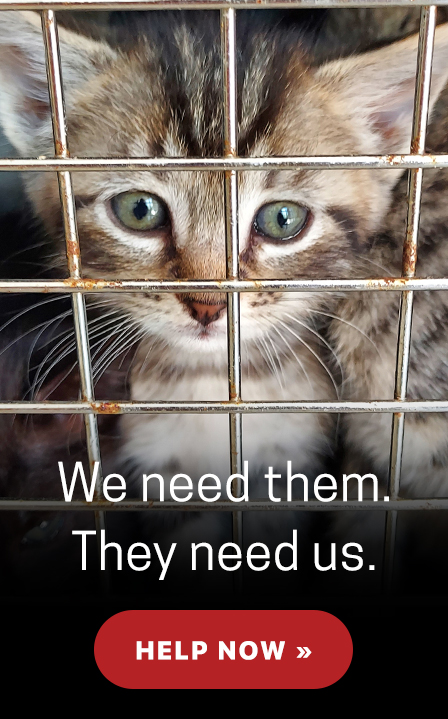PALM BEACH, FLORIDA, August 24, 2020 — Tropical Storm Laura is predicted to become the fourth hurricane of 2020, while Tropical Storm Marco is also forecast on a collision course with America’s Gulf Coast. American Humane, the country’s first national humane organization, urges pet owners in the storms’ path to take precautionary safety measures ahead of expected heavy rain and life-threatening flash flooding. Marco is currently headed towards Louisiana and Laura continues to pick up strength just south of Florida.
“It is already clear that 2020 will be a busy Atlantic Hurricane season and given the strength and frequency of the incoming storms, it is more important now than ever before to ensure you can protect not only yourself, but also your beloved pets,” said Robin Ganzert, CEO and president of American Humane. “Amidst the tragedy of past hurricanes, hundreds of thousands of pets died or were displaced as unprepared families were forced to leave them behind. We want to ensure no family member is forgotten.”
This is the first time in recorded history that two hurricanes could potentially power through the Gulf’s warm waters simultaneously. As the east coast braces for impact, animal rescue experts at American Humane issue key disaster preparedness tips to help keep you, your family and your animals safe – before, during and after a storm:
Before the storm
- Microchip pets or put a tag on their collar with your name, address and cellphone number so they may be returned quickly in case you are separated from your pets.
- Tie down or anchor outside objects that might fly about and injure someone.
- Evacuate your family and pets as early as you can and remember to take your disaster preparedness kit for your pets (i.e. First Aid kit, leashes, and pets’ carrying cases, bowls, sanitation materials, chew toy, minimum 3 days, ideally 7-10 days of food, meds, water).
- Bring pets inside; bring outdoor animals inside with a carrier ready large enough to turn around and lie down comfortably.
- Review your evacuation plan and double-check emergency supplies, bowls, water, food.
- Have a carrier at the ready.
- If your family must evacuate, take your pets with you.
During the storm….if you cannot evacuate
- Choose a safe room for riding out the storm—an interior room without windows – and take your entire family there, including your pets.
- Stay with pets. If crated, they depend on you for food and water.
- Keep your emergency kit in that room with you (food, water, litter, meds).
- Know your pet’s hiding places. That’s where they may run; keep them with you.
- Secure exits and cat doors so pets can’t escape into the storm.
- Do not tranquilize your pets. They’ll need their survival instincts should the storm require that.
After the storm
- Make sure the storm has fully passed before going outside and assess damages before allowing animals out.
- Keep dogs on a leash and cats in a carrier. Displaced objects and fallen trees can disorient pets and sharp debris could harm them.
- Give pets time to become re-oriented. Familiar scents and landmarks may be altered and cause a pet to become confused or lost.
- Keep animals away from downed power lines and water that may be contaminated.
- Uncertainty and change in the environment affect animals, too, presenting new stresses and dangers. Your pet’s behavior may change after a crisis, becoming more aggressive or self-protective. Be sensitive to these changes and keep more room between them, other animals, children or strangers. Animals need comforting, too. Comfort your pet with kind words and lots of pats or hugs. If possible, provide a safe and quiet environment, even if it is not their own home.
“Hurricanes are among the deadliest of storms,” Ganzert said. “Fortunately, American Humane Rescue has worked in disaster relief for more than 100 years and has amassed a lot of practical knowledge on how families can prepare and, if there is no way to avoid the storms, weather them as well as possible and keep loved ones safe afterwards.”
About American Humane
American Humane is the country’s first national humane organization. Founded in 1877, American Humane is committed to ensuring the safety, welfare, and well-being of animals, and our leadership programs are first to serve in promoting and nurturing the bonds between animals and people. For more information or to support our work, please visit www.americanhumane.org.
About the American Humane Rescue program
The American Humane Rescue program was created in 1916 and began rescuing and aiding some 68,000 war horses wounded on the battlefields of World War I Europe each month. Since then, they have been helping animals of every kind and have been involved in virtually every major disaster relief effort from Pearl Harbor to 9/11, the Joplin, Missouri and Moore, Oklahoma tornadoes, the Japanese and Haitian earthquakes, Hurricanes Katrina, Sandy, Harvey, Maria, Florence and Michael, and the California wildfires. The American Humane Rescue team saved, sheltered and fed more than 700,000 animals in the past two years alone. To support their lifesaving work, please visit www.AmericanHumane.org.

